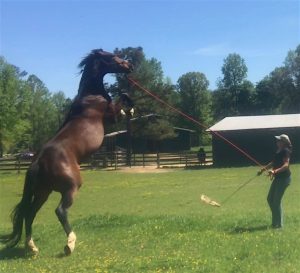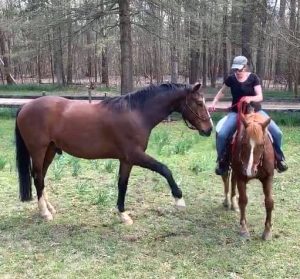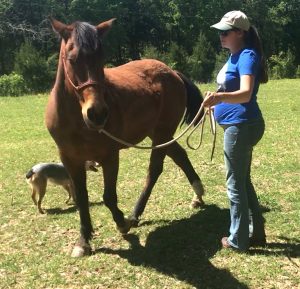Editor’s Note: Amy Skinner is a regular guest columnist and has been a horse gal since age six. She will present an arena demonstration with fellow trainer and rider, Katrin Silva, at the Best Horse Practices Summit.
She rides and teaches dressage and Western. Skinner has studied at the Royal Andalusian School of Equestrian Art in Spain, with Buck Brannaman, Leslie Desmond, Brent Graef, and many others. Visit her site here.

Amy Skinner works with Quixote
Amy Skinner writes:
A client recently asked me why I was not afraid when working with her horse. Quixote had lunged at me, kicked at me, and tried to bite me. She said she was afraid of him. Why wasn’t I? He was now standing peacefully and with a soft eye while we groomed him. He was not the horse he once was.
I thought about it for a while before answering. Finally I said, I’m not afraid of him because I understand him. He’s only behaving how he learned to behave, how he thinks he needs to behave to get by. Being afraid of him would do him a tremendous disservice and would keep me out of the moment, unable to think clearly and react.
Quixote’s behavior wasn’t personal. Though the front feet were aimed at me, he viewed his entire world as a threat. Imagine living life that way and how deeply unhappy he must have been.
I don’t waste my time with fear because I’m busy trying to change his life. When you understand the horse’s mind and have a good idea of what causes their behavior, fear tends to go away. Imagine being on an airplane for the first time and  hearing the loud engine, seeing the wing flaps lift, and feeling sudden turbulence. If you don’t not understand how airplanes work, or the purpose of these sounds, it’d feel scary. Similarly, when people don’t understand what horses’ expressions or what causes their behaviors, they may get afraid.
hearing the loud engine, seeing the wing flaps lift, and feeling sudden turbulence. If you don’t not understand how airplanes work, or the purpose of these sounds, it’d feel scary. Similarly, when people don’t understand what horses’ expressions or what causes their behaviors, they may get afraid.
Fear is warranted when you understand what you see, but lack the skill to do much about it. Fear is nature’s way of expressing danger, and it’s important to listen to that feeling. However, with knowledge and skill, you have the power to eliminate a feeling that can take control and overpower common sense.
“Don’t be afraid” is among the worst pieces of advice I’ve ever heard. If you fear working with a specific horse or maybe all horses, get some help. Find a good coach who can walk you through exercises that build your knowledge base and confidence.
- Start small, maybe work with a horse that does not bring up fear in you.
- Find tasks that help you learn and see expression in the horse and the behaviors associated with unsafe situations.
- Learn how to confirm that behavior or redirect it.

Later in the training
If you see relaxation building on the horse, that’s one you’d want to confirm. If you see fear, tension, distraction, etc, learn to redirect to something better, ideally before those behaviors exhibit themselves. When you have knowledge and skill under your belt, you have the freedom to be spontaneous, flexible, and most importantly, mentally quiet. Without the voice of fear distracting you, saying “what if” in the background, you can accomplish so much.
As for the horse that bit, kicked and lunged at me? Quixote no longer does those things. Months of being redirected to more positive behaviors have shown him how to be happy, relaxed, and engaged in his work. Fear on my end would have kept me out of the moment and kept me from helping him.
beautifully stated
I hate to say this, but I will anyway. Wait until you’re older Amy. There’s a fear or maybe an abundance of caution that comes over many riders in their 50s, 60s, and older. It’s easier for us to be dislodged and if we are, we’re more likely to be hurt and the healing process will take longer.
I was never a clinician or a bronc rider, but I rode green horses, spoiled horses and some really wonderful horses without incident until my 50s. Then I came off one of my horses in a bucking incident and broke six ribs, bruised a lung and suffered a concussion. I’ve come off another of my horses several times with bruised ribs and another concussion.
For us old folks, fear can be quieted by working with our horses to build trust and a good relationship. It also helps to work hard to keep our weight under control and build fitness. Buck Brannaman has an expression — lawn dart — to convey the feeling of being ejected from your horse and landing badly. If you’ve maintained your level of fitness, worked on core strength and balance, and kept your weight under control, you will not be a lawn dart.
So yes you need to build relaxation and confidence with your horse, but you have to work hard on fitness and weight as an older person. You don’t want to fear being a lawn dart!
Great article with some very useful information. I especially liked the analogy to flying in an airplane for the first time and the fear one could feel from not understanding.
Hi Paul – I’m not bronc rider myself and I definitely don’t ride horses that buck if I can help it. I’m not fearful but I know my limits. I take my time and go as slow as I have to to keep those things from coming up, and I prepare my horses the best I can. That being said fitness is extremely important. Stiffness, excess weight, lack of fitness, and lack of range of motion are going to all make it easier to come off. Have fun and be safe! Thanks for your comment